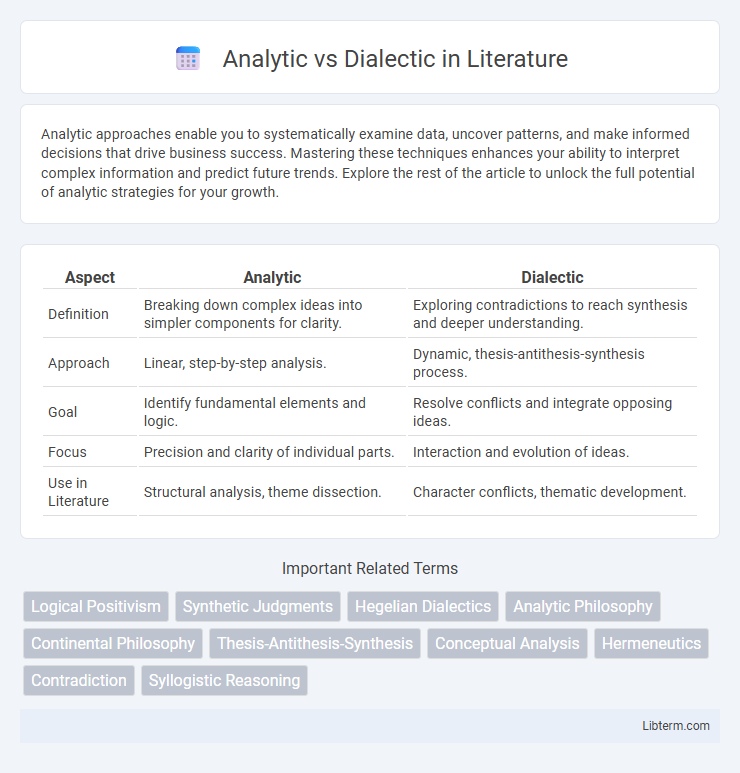Analytic approaches enable you to systematically examine data, uncover patterns, and make informed decisions that drive business success. Mastering these techniques enhances your ability to interpret complex information and predict future trends. Explore the rest of the article to unlock the full potential of analytic strategies for your growth.
Table of Comparison
| Aspect | Analytic | Dialectic |
|---|---|---|
| Definition | Breaking down complex ideas into simpler components for clarity. | Exploring contradictions to reach synthesis and deeper understanding. |
| Approach | Linear, step-by-step analysis. | Dynamic, thesis-antithesis-synthesis process. |
| Goal | Identify fundamental elements and logic. | Resolve conflicts and integrate opposing ideas. |
| Focus | Precision and clarity of individual parts. | Interaction and evolution of ideas. |
| Use in Literature | Structural analysis, theme dissection. | Character conflicts, thematic development. |
Introduction: Defining Analytic and Dialectic Thinking
Analytic thinking involves breaking down complex problems into smaller, manageable parts to understand their structure and relationships clearly, emphasizing logical reasoning and evidence-based conclusions. Dialectic thinking centers on exploring contradictions and integrating opposing viewpoints through reasoned dialogue, aiming to synthesize new ideas or resolve conflicts. Both approaches play crucial roles in critical thinking, with analytic methods dissecting issues and dialectic methods fostering holistic understanding through dynamic interaction.
Historical Origins of Analytic and Dialectic Approaches
Analytic philosophy originated in the early 20th century with figures like Bertrand Russell and Ludwig Wittgenstein emphasizing logical clarity and linguistic analysis rooted in Frege's formal logic. Dialectic approaches trace back to ancient Greece, notably Plato and Hegel, focusing on the development of ideas through dialogue and contradiction to reveal deeper truths. The historical divergence highlights analytic philosophy's grounding in formal logic versus dialectic's emphasis on dynamic, historical, and social processes in the evolution of concepts.
Core Principles of Analytic Reasoning
Analytic reasoning is grounded in core principles such as clarity, precision, and logical consistency, emphasizing the breakdown of complex concepts into simpler components for detailed examination. It relies heavily on formal logic, categorization, and the verification of facts through empirical evidence to build valid conclusions. This approach prioritizes structured argumentation and rigorous evaluation of premises to ensure soundness and objectivity in problem-solving across disciplines.
Key Features of Dialectic Reasoning
Dialectic reasoning centers on the synthesis of opposing ideas through structured dialogue, emphasizing contradiction resolution and dynamic truth development. Key features include the exploration of thesis and antithesis, critical questioning, and iterative refinement of concepts to achieve deeper understanding. This method contrasts with analytic reasoning by prioritizing holistic integration over isolated logical analysis.
Analytic vs Dialectic: Comparative Analysis
Analytic thinking emphasizes logical reasoning, breaking down complex problems into smaller components to derive clear conclusions, while dialectic thinking involves exploring contradictions and synthesizing opposing viewpoints to reach a deeper understanding. Analytic methods prioritize clarity, precision, and systematic evaluation, commonly applied in scientific research and formal logic. Dialectic approaches foster critical dialogue and dynamic reasoning, often utilized in philosophy and conflict resolution to integrate diverse perspectives.
Applications in Philosophy and Science
Analytic methods in philosophy and science emphasize logical reasoning, clarity, and decomposition of concepts, supporting rigorous argumentation and hypothesis testing. Dialectic approaches prioritize the resolution of contradictions through dialogue and synthesis, facilitating the evolution of ideas and paradigms in complex or abstract contexts. Both methods are crucial: analytic techniques dominate in formal logic and empirical research, while dialectic processes underpin critical theory, ethics, and developmental theories in philosophy.
Cognitive Processes: How Analytic and Dialectic Differ
Analytic thinking emphasizes logical reasoning, breaking down information into distinct parts to evaluate and synthesize data systematically. Dialectic thinking integrates opposing ideas, fostering cognitive flexibility by balancing contradictions and generating new insights through synthesis. These processes engage different neural pathways: analytic relies on linear, structured cognition, while dialectic activates dynamic, integrative mental functions.
Cultural Influences on Analytic and Dialectic Thinking
Cultural influences shape analytic and dialectic thinking by emphasizing different cognitive styles: Western cultures prioritize analytic thinking characterized by object-focused reasoning and abstract categorization, whereas East Asian cultures favor dialectic thinking, which involves considering contradictions, context, and relational understanding. Research shows that exposure to Confucian ideals often enhances dialectical reasoning, promoting harmony and balance, while Western education systems reinforce logic, consistency, and linear problem-solving typical of analytic thought. These cultural frameworks impact decision-making, conflict resolution, and perception, highlighting the importance of cultural context in cognitive processing and cross-cultural communication.
Strengths and Limitations of Each Approach
Analytic philosophy excels in clarity, precision, and logical rigor, making it effective for dissecting complex concepts and eliminating ambiguity, but it can be overly reductionist, sometimes missing broader contextual insights. Dialectic methods foster dynamic dialogue and synthesis of opposing viewpoints, enhancing understanding through contradiction and evolution of ideas; however, they may lack the definitive conclusions and structured framework characteristic of analytic approaches. Balancing the strengths of both--analytic rigor with dialectical flexibility--can lead to more comprehensive philosophical inquiry and problem-solving.
Conclusion: Integrating Analytic and Dialectic Methods
Integrating analytic and dialectic methods enhances problem-solving by combining critical examination with dynamic dialogue, fostering deeper understanding and innovation. Analytic methods break down complex issues into components for precise evaluation, while dialectic approaches synthesize conflicting viewpoints through structured discourse. This integration leverages the strengths of both to achieve balanced, well-founded conclusions in diverse fields such as philosophy, communication, and decision-making.
Analytic Infographic

 libterm.com
libterm.com